
Please allow at least one month before your first visit. A series of laboratory tests will need to be ordered and should be completed no later than two weeks prior to your initial consultation. This helps us ensure that we have all the necessary information for your appointment.
If you are traveling far for your appointment, we suggest flying in over the weekend to give yourself time to settle in before your initial meeting with the doctor on Monday.
For accommodation recommendations, you can check out the Accommodations Page.
After your consultation, any additional tests or images will be ordered and scheduled.
Plan to schedule follow-ups to monitor the progress of the treatment plan. All plans, except the Option One Prevention Program, include one or more follow-up appointments as part of the package. These visits are essential to ensure we are on track with your health goals.
Appointments for quarterly follow-up visits will be scheduled on either Mondays or Thursdays.
Dr. Jamnadas will host educational seminars on Wednesdays, with time for Q&A. Attendance is strongly encouraged, as education is a big part of our mission and important to the client’s journey to achieving optimal health.
We do not take insurance.
Click here to check out the Prevention Program Packages.

What Tests and How to Prepare
Here is a list of tests we use to better understand the status of your health
and some tips on how to prep for them.
Best Practice:
Always arrive 15-20 minutes early to allow for any paperwork to be completed
and any prep time needed.
Abdominal Ultrasound
This non-invasive ultrasound provides a visual to assess the organs and structures within the abdomen, such as the liver, gallbladder, pancreas, bile ducts, spleen, and abdominal aorta.
Why we order this test:
The main reason we include this test is to look for a fatty liver, which predates clinical disease by 15 to 20 years, predicting the possibility of diabetes and coronary artery disease. Signs of a fatty liver are linked to some future developments of cancers. The ultrasound of the liver can be helpful because it also detects fat around the pancreas. Using this test to detect a fatty liver will allow changes and prevention protocols to be made immediately.
Test Preparations:
- Do not consume any food or beverage 8-12 hours before. This allows for a clear image.
- If you need to take medication, take one pill with one sip of water.
- A clear gel is used during this process.
Abdominal Aorta Ultrasound
This non-invasive ultrasound shows images of the aorta, which is the main blood vessel leading away from the heart.
Why we order this test:
This test provides images showing the health and walls of the aorta. Weakening of the walls combined with high pressure, can cause the vessels to bulge or form a sac, potentially leading to a rupture. This rupture is known as an aneurysm.
Test Preparations:
- Do not consume any food or beverage 8-12 hours before. This allows for clear images.
- If you need to take medication, take one pill with one sip of water.
- A clear gel is used during this process.
Comprehensive Labs
The comprehensive labs are an extensive panel that looks at biomarkers and inflammatory markers that help predict risks of cardiovascular disease.
Why we order this test:
This blood test goes beyond a standard lipid panel, providing detailed insights into the size of your LDL particles (cholesterol or fats), which reveals the source and severity of inflammation in the body. By measuring key inflammatory markers and congenital risk factors, such as high levels Lipoprotein (a), this can help predict the risk of heart attack or stroke. The Omega panel evaluates your omega-3/omega-6 ratio, which can shed light on fatigue, sluggish brain function, and excessive levels of corn and soy oil in your system. This comprehensive test is crucial for managing patients with cardiovascular disease or risk factors.
Test Preparations:
- The lab company partners with mobile phlebotomy companies across the United States, offering someone in your area come to do the sample collection.
Coronary Calcium Score
A coronary calcium scan is a specialized CT scan of your heart which enables us to detect the buildup of calcium containing plaque inside the coronary arteries of the heart. The score is determined by the scan and comparing your number with median values based on your age and gender.
Why we order this test:
A higher score means that you have more evidence for heart disease and are more likely to experience a problem such as a heart attack. If your number exceeds the median, it’s important to make changes to reduce your cardiovascular risk factors. The buildup of calcium in the coronary arteries predates clinical coronary artery disease by at least 10 to 20 years.
Test Preparations:
- Do not consume caffeine or stimulants 12 hours prior to the scan, as this can affect your normal base heart rate.
To learn more about the process and what this test entails
you can watch Dr. Jamnadas’ video
CT Angiogram
CTA is a non-invasive method for detecting blockages in coronary arteries. This procedure uses a dye which aids in determining whether plaque or calcium deposits are present inside the arteries.
Why we order this test:
Using the latest CT scan technology, we can determine whether plaque or calcium buildup in the arteries is soft or hard—a crucial factor in assessing artery health and the risk of heart attack or stroke.
Test Preparations:
- Clients will be required to have labs drawn within 7 days of this study to check kidney function prior to contrast injection and a follow-up after to make sure the dye has cleared the system.
- If you have an iodine allergy, please let the tech know ahead of time.
- When the contrast is administered you might experience a metallic taste in your mouth and a warming feeling all over, which usually only lasts about 30 seconds.
- Do not consume caffeine/stimulants for 12 hours prior to your test.
- Do not consume antihistamines for 12 hours prior to the test.
- Do not take any erectile dysfunction medications for 48 hours prior to the test.
- Do not smoke for 4 hours prior to the test.
To learn more about the process and what this test entails
you can watch Dr. Jamnadas’ video
Echocardiogram (ECHO)
This ultrasound shows detailed pictures of the heart chambers and valves and allows for the evaluation of the heart’s function.
Why we order this test:
The purpose of this test is to detect hypertrophic cardiomyopathy, a genetic disease that thickens the heart’s muscles impairing its ability to pump blood. Many individuals with this condition may not experience noticeable symptoms, and it can affect even the healthiest individuals.
Test Preparations:
- No special preparation instructions required.
To learn more about the process and what this test entails
you can watch Dr. Jamnadas’ video
Kraft Test
This blood test measures the way the body responds to both glucose and insulin in response to a “glucose challenge” (a sugary solution) and how long it takes to return to baseline.
Why we order this test:
This test assesses how your body produces insulin to regulate blood sugar, helping determine if you have insulin resistance. Insulin resistance can lead to severe obesity, difficulty losing weight, fatty liver, hypertension, abdominal fat, small dense LDL particles, and increased risks of heart attack, stroke, and other vascular diseases.
Test Preparations:
- Baseline measurements are taken at the 30 minutes, 1 hour, 2 hours, and 3 hours marks, so please budget for this time accordingly.
To learn more about the process and what this test entails
you can watch Dr. Jamnadas’ video
Vibrant Wellness
This cutting-edge biotech lab has pioneered comprehensive testing using blood, urine, saliva, and stool samples to assess gut health and identify the underlying causes of inflammation in your body. It provides detailed insights into food and chemical sensitivities, as well as deficiencies in essential vitamins, minerals, and gut bacteria species.
Why we order these tests:
Gut Zoomer: This test analyzes a stool sample to assess the diversity and balance of bacteria in your microbiome. It also helps identify small intestinal bacterial overgrowth (SIBO), a treatable condition, and evaluates intestinal permeability, which impacts liver health, metabolic function, and can contribute to neurological issues. The insights gained from this test are crucial for reducing inflammation and enhancing gut health, both of which are essential for overall well-being.
Wheat Zoomer: This test uses a blood sample to assess how your body responds to wheat, a key trigger of intestinal dysfunction. Wheat can lead to a leaky gut and contribute to food sensitivities. By identifying this major source of inflammation, the test provides valuable insights that can help you avoid this trigger, reduce inflammation, and improve gut health by minimizing your body’s negative reactions.
Heavy Metals: This test uses a blood and/or urine sample to detect the presence of heavy metal toxins stored in the body’s fat cells. These toxins disrupt redox balance within tissues, impairing vital metabolic processes such as enzyme activity and mitochondrial function. The test identifies the specific types of toxins and their toxicity levels, providing the foundation for an effective treatment plan.
Environmental Toxins: This test uses a urine sample to detect difficult-to-identify toxins commonly found in everyday exposures, such as in water and food. These toxins must be removed from the body to improve overall health. Once the specific toxins affecting you are identified, their sources can be pinpointed, allowing for targeted elimination and helping restore normal metabolism, enzyme activity, and hormonal function.
Food Sensitivities: This test uses a blood sample to identify your body’s reactions to an extensive list of foods. It is essential for pinpointing which foods trigger inflammation in the gut, potentially leading to gastrointestinal permeability issues.
Test Preparations:
- These tests are mailed to you and done from the comfort of your home.
- Detailed guidelines for each of the tests can be found on Vibrant’s website.
